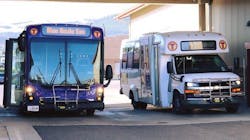Smaller transit providers suspending service or limiting to medically necessary trips due to COVID-19 concerns
While transit agencies in larger cities continue to operate service and take hits in both ridership and revenues, smaller transit providers are temporarily halting service to mitigate the spread of novel coronavirus (COVID-19). While some are ceasing all service, others are concentrating on providing only medically essential trips.
Livingston Essential Transportation Service (LETS) in Livingston County, Mich., suspended service March 17 through April 5. LETS will continue to operate service for dialysis patients and other medical rides with the help of a dozen volunteer drivers. In addition, LETS is working with community organizations, such as Meals on Wheels and local food pantries, to ensure meals are being delivered.
“This decision was not taken lightly as we know that LETS is the primary mode of transportation for many of our passengers. However, in light of the county's closure and guidance from state and local health officials we feel that this decision is in the best interests of our passengers, employees and the entire community,” LETS posted online.
Macatawa Area Express (MAX), which serves Holland, Mich., suspended all bus routes March 18, but will provide work, medical rides and grocery store rides through its Reserve-A-MAX service. These rides will need to be reserved by 4:00 p.m. the day prior to the trip.
Greater Glens Falls Transit (GGFT) plans to suspend all transit services in the North Country of New York State on March 23 until conditions warrant service restoration.
“GGFT deeply regrets any inconvenience or hardship that this may cause its many riders. However, going forward during this public health emergency, GGFT cannot satisfactorily guarantee or maintain the CDC recommended precautions of minimum social distancing or maximum group gathering size limits aboard its buses,” GGFT wrote in a notice. “This decision has been made in the best interest of public health and in support of efforts locally and across the nation to contain the spread of COVID-19 as much as possible.”
Green Bay Metro Transit in Green Bay, Wisc., stopped regular public transportation service on March 16, but continues to provide paratransit services for medically necessary trips. Green Bay Mayor Eric Genrich says he regrets the disruption, but the city must err on the side of caution.
“Social distancing is critical at this time to keep everyone healthy and safe. This is difficult to do with the services Green Bay Metro provides. We are committed to reinstating transportation services when we can ensure a safe environment for our employees, riders and the public,” said Green Bay Metro Transit Director Patricia Kiewiz.
Great Falls Transit in Great Falls, Mont., cancelled all fixed route services through March 27 and will provide medical rides only through its paratransit service.
Another Montana-based service to halt fixed-route operations is Capital Transit in Helena. It cited concern surrounding its limited number of qualified drivers and buses. The loss of a portion in either category would impact service. Capital Transit says it will continue its paratransit service, but noted this could change at any time.
This pandemic has left its impact on the entire industry as Congress works to finalize the next stimulus package, referred to as Phase Three, which may provide funds for specific industries, such as transit.
The U.S. Department of Transportation published a blog March 18 reiterating its commitment to keeping transportation systems operating at a high level. Secretary of Transportation Elaine Chao explained small transit operators can use federal formula funding to cover half of their operating expenses, including items such as personal protective equipment, such as facemasks, gloves or hand sanitizer. Additionally, the Federal Transit Administration’s (FTA) Emergency Relief Program allows transit agencies operating in states that have declared an emergency to use urban and rural transit formula funding to pay up to 80 percent of the cost of activities aimed at containing COVID-19.
“Transportation systems are always important for communities and our country, and never more so than during a crisis. That’s why so many at the U.S. Department of Transportation are working overtime to respond to the ongoing COVID-19 (coronavirus) situation affecting the U.S. and the world,” wrote Secretary Chao.

Mischa Wanek-Libman | Group Editorial Director
Mischa Wanek-Libman is director of communications with Transdev North America. She has more than 20 years of experience working in the transportation industry covering construction projects, engineering challenges, transit and rail operations and best practices.
Wanek-Libman has held top editorial positions at freight rail and public transportation business-to-business publications including as editor-in-chief and editorial director of Mass Transit from 2018-2024. She has been recognized for editorial excellence through her individual work, as well as for collaborative content.
She is an active member of the American Public Transportation Association's Marketing and Communications Committee and served 14 years as a Board Observer on the National Railroad Construction and Maintenance Association (NRC) Board of Directors.
She is a graduate of Drake University in Des Moines, Iowa, where she earned a Bachelor of Arts degree in Journalism and Mass Communication.


